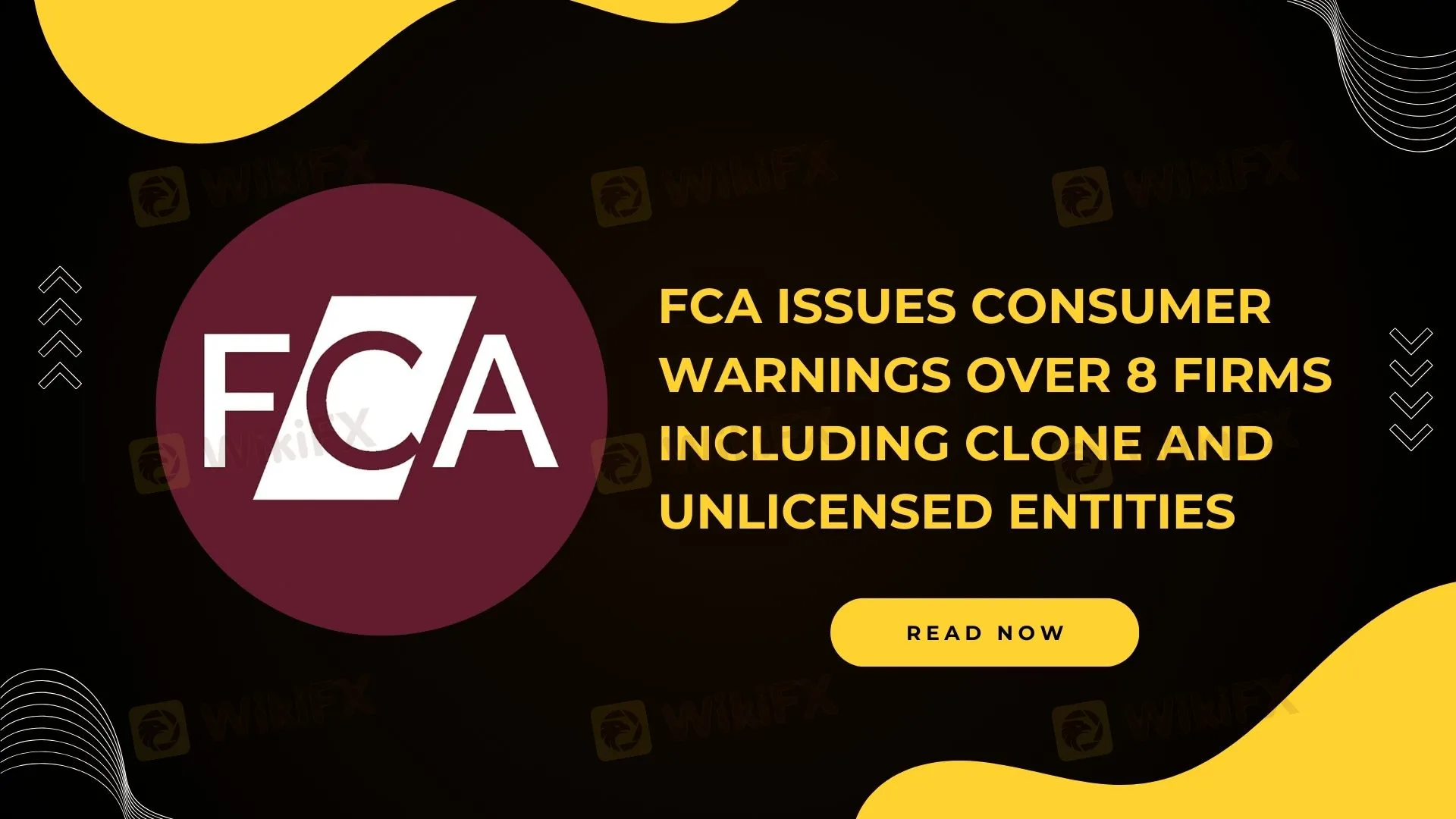FCA Issues Consumer Warnings Over 8 Firms Including Clone and Unlicensed Entities
Abstract:The UK regulator has identified eight firms using deceptive tactics, including fake credentials and copycat websites, to offer unauthorised financial services to the public.

The UK Financial Conduct Authority (FCA) has issued a set of warnings against eight firms found to be offering financial services in the UK without proper authorisation. Among the entities flagged are both unlicensed operators and so-called “clone firms,” which fraudulently impersonate legitimate, FCA-authorised businesses to deceive consumers.
According to the FCA, clone firms are particularly deceptive because they often use names, addresses, registration numbers, or email domains that closely resemble real firms. In some cases, scammers may even direct consumers to fake websites that appear professional and legitimate. Once contact is established, victims are typically persuaded to transfer funds, thinking they are dealing with a regulated company.
The eight companies named in the latest warning include:
- Premium Loan / premiumloans.org – Clone of Premier Loans Ltd
- foundingassetmgt.com – Clone of Founding Asset Management Limited
- Believe Loan / believeloan.co.uk – Unauthorised lender
- RENDELMAN-JENNINGS CORPORATE LLC – Unregistered firm operating internationally
- Solpension AI / webtrader.solpension.co – Unlicensed platform promoting investment products
- Gavel Trades / gaveltrades.com – Unregulated financial platform
- Audacity Capital / audacitycapital.trade – Unauthorized trading website
- SONIX / sonixtrades.org – Platform offering services without FCA oversight
These firms, often appearing credible at first glance, commonly advertise through search engines, social media, or unsolicited emails. Their tactics may involve high-pressure sales techniques, guarantees of unrealistic returns, or limited-time offers meant to push users into rapid decisions. Once an investor transfers funds, it becomes exceedingly difficult to recover the money—especially when the firms operate offshore or lack any physical presence in the UK.
The FCA reminds consumers that dealing with unauthorised firms comes with significant risk. Victims of scams involving such entities are not eligible for support from the Financial Ombudsman Service or the Financial Services Compensation Scheme (FSCS), meaning financial losses are often irreversible.
Furthermore, the FCA urges financial professionals, journalists, and digital advertisers to remain vigilant and to report any suspicious platforms that may be misleading investors. The rise in clone firm activity also underscores the importance of digital literacy and fraud education as tools for investor protection.
Read more

Pi Network: Scam Allegations Spark Heated Debate
A whistleblower report has surfaced, casting doubt on the legitimacy of Pi Network, alleging psychological manipulation, opaque operations, and potential financial exploitation. What is your take on this?

PayPal Account Holders Warned of Surge in Scams
Experts warn of increased PayPal scams, including fake emails and gift cards. Stay alert to protect your account from cybercriminals.

BaFin Flags 5 Unauthorised Financial Platforms for Consumer Risk
Germany’s financial watchdog BaFin has raised alarms over five unlicensed platforms—FxMiracles Inc., Aktien Network, Euro Pro Markets, ZukunftsFinanz Stiftung, and ConsorsGlobal. These entities were found offering investment and crypto-related services to German users without proper regulatory approval, often using misleading websites, fake affiliations, or anonymous messaging channels.

UN Warns Asian Scam Operations are Spreading Worldwide
UN report reveals Asian scam operations expanding globally, targeting Africa, Latin America with cyberfraud, generating billions amid crackdowns.
WikiFX Broker
Latest News
Love, Investment & Lies: Online Date Turned into a RM103,000 Scam
Broker Took 10% of User's Profits – New Way to Swindle You? Beware!
Pi Network: Scam Allegations Spark Heated Debate
Broker Comparsion: FXTM vs AvaTrade
Account Deleted, Funds Gone: A New Broker Tactic to Beware Of?
Broker’s Promise Turns to Loss – Funds Disappear, No Compensation!
StoneX Subsidiary, Gain Global Markets Bermuda, Penalized for Trading Misconduct
El Salvador and U.S. Launch Cross-Border Crypto Regulatory Sandbox
The Instagram Promise That Stole RM33,000
Coinbase Launches Bitcoin Yield Fund for Institutional Investors
Rate Calc
